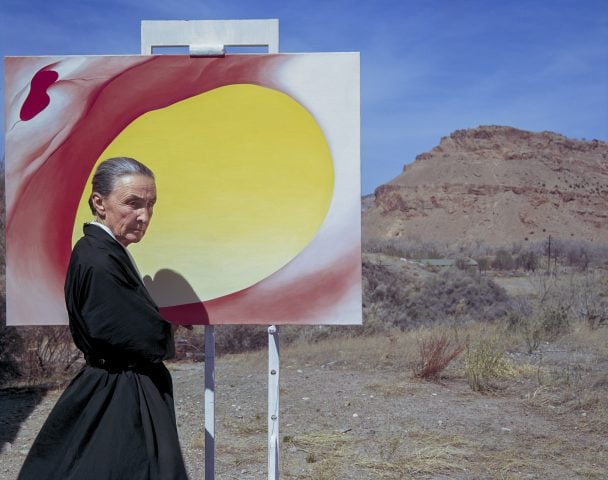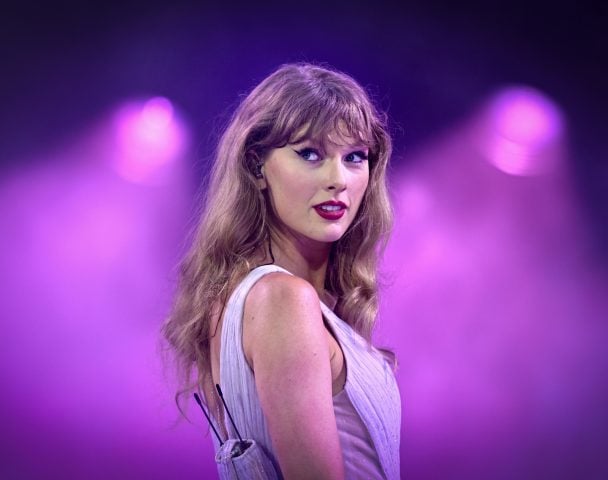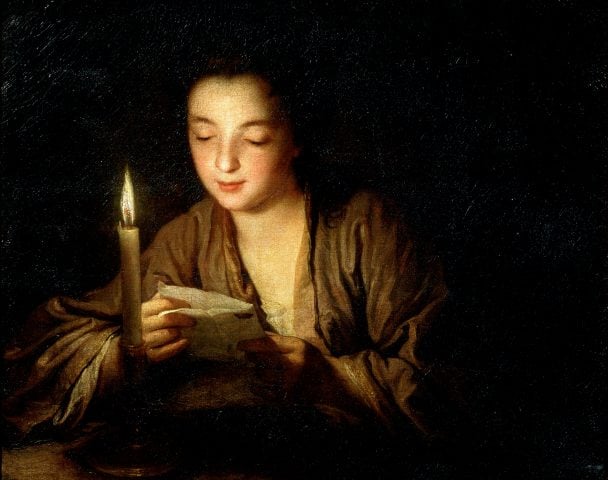Market
Following the Market’s Banana Boost, Experts’ Outlook for Art Basel Miami Beach Is Bright
Textile artists, who continue their rise in the market, and institutionally linked artists of color will have strong showings at the fair.
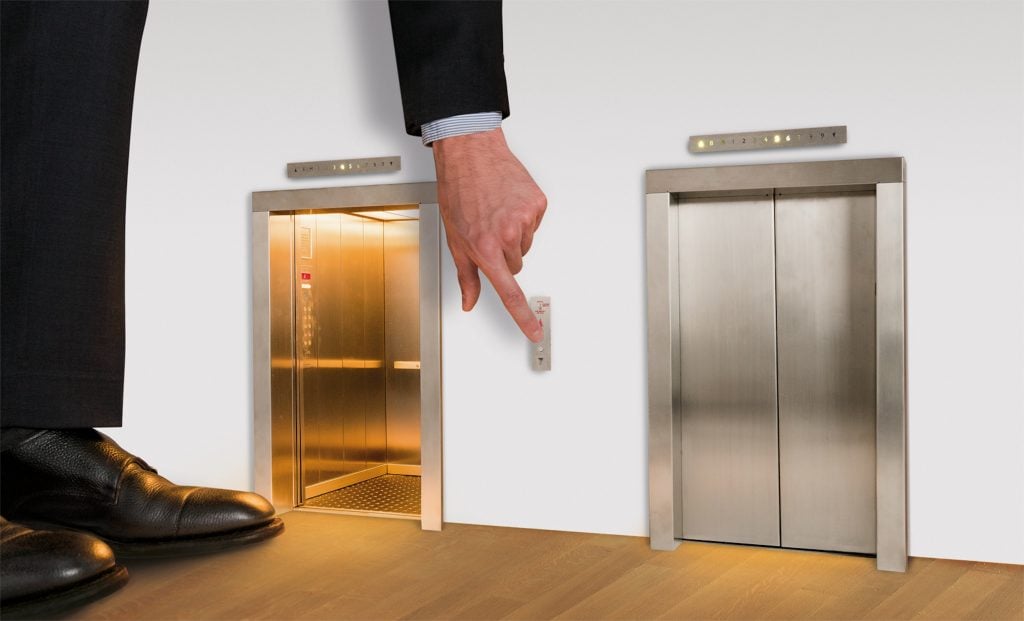
Coming off a $1.3 billion New York auction week that was a mixed success, the art world is gearing up for the next major market bellwether: the 2024 edition of Art Basel Miami Beach (December 6 through 8). The fair will host 286 galleries from 38 countries and territories at the Miami Beach Convention Center this year; it is also the first edition under the stewardship of veteran gallerist Bridget Finn.
Things will look and feel different. Finn is hosting the largest group of newcomers since 2008, with some 34 first-timers attendees. The previously separated Meridians section of large-scale works will be folded into the main floor plan, between the sections Nova and Positions, both of which highlight newer works and galleries.
Following the U.S. elections in November and reasonably successful auctions in mid-November, New York advisor Anwarii Musa predicts a domino effect—in a good way, for once. “People were waiting for the elections to be over,” he said. “I’ve been in this space 15 years, so I’ve seen the ebbs and flows,” he said. This fair, he feels confident, will be in the “flow” category.
Los Angeles advisor Victoria Burns is similarly bullish. “I’m totally optimistic,” she said in a phone interview. “Slow summers are normal, but after that, there was a real holding of breath. Now, there’s a sense of relief, not because of who won the election, but because it’s over. My clients are coming to the fair and they’re excited.”
At the same time, she sees a sobered-up market after a blitz followed by a much-discussed slump.
“You’ve heard that the market is more ‘discerning’ now,” she said. “People are able to take a little more time and occasionally even sleep on it before making an acquisition.”
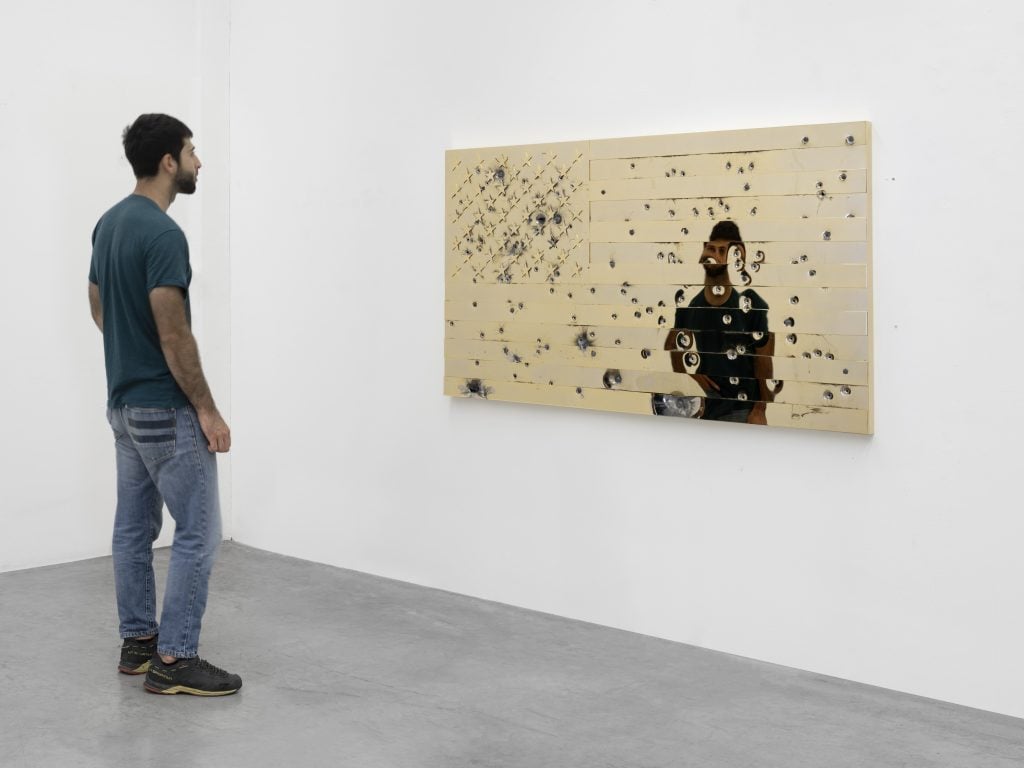
Maurizio Cattelan, Under, 2024. Courtesy Massimo de Carlo.
Maurizio Cattelan and American Self-Image
Don’t think you can escape the star of auction week. Maurizio Cattelan, the trickster artist who was the mastermind behind the $6.2 million banana called The Comedian that dominated auction week headlines, will be in evidence.
Massimo de Carlo (Milan, London, Hong Kong, Paris, Beijing, and Seoul) is planning to show the Italian artist’s Under (2024), a gold-plated, mirror-polished, bullet-pierced steel panel bearing the image of the U.S. flag. “Gold and guns are the American dream,” the artist has said. It’s priced between €500,000 and €1 million (about $525,000 and $1,050,000); the work harks back to much-discussed gun-shot panels the artist offered at Gagosian for $375,000 each.
Cattelan’s Under isn’t the only work that nods to the state of the nation; Berlin gallery neugerriemschneider is offering three works that riff on the U.S. flag. American filmmaker James Benning’s work glory (2018), a two-hour video showing a flag flying at a decommissioned North Carolina lighthouse, torn to shreds by the oncoming Hurricane Florence. (His daughter, Sadie Benning, will have works on view with Vielmetter Los Angeles.) And two-time Turner Prize nominee Mike Nelson will show untitled (self portrait as a gulf war veteran), 2018, in which a sweatshirt emblazoned with a bald eagle flying the flag hangs in a storage locker. Thai artist Rirkrit Tiravanija’s untitled 2018 (white flag, black text) shows a U.S. flag in all white, overlaid by the words “the odious smell of truth.” The gallery did not supply prices.
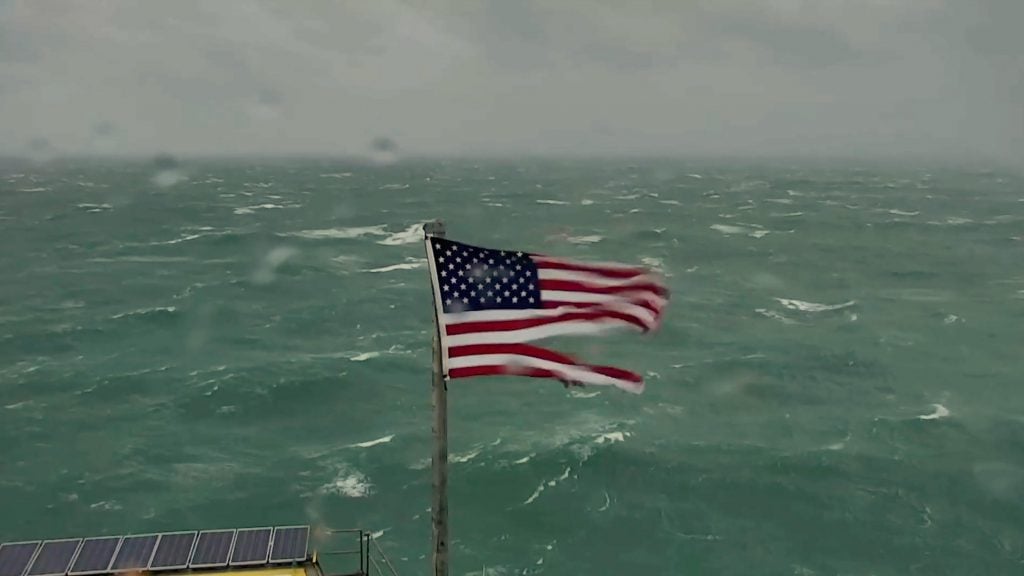
James Benning, glory (2018) © James Benning. Courtesy the artist and neugerriemschneider, Berlin.
But if Cattelan cheekiness is what you are looking for more widely, there is delicately surrealist work being showcased by Marian Goodman (New York, Paris, Los Angeles). His diminutive 2001 sculpture Untitled (elevator), consists of a pair of ankle-high elevators, embedded in a wall, outfitted with lighting, mirrored interiors, chrome doors, and dinging bells. The price to take these home is $1.5 million.
Were you an underbidder on the banana? A consolation prize could be Clown (2024), an editioned work on paper that New York dealer Carolina Nitsch produced for Gotham’s New Museum. The image shows a banana peel, seemingly adhered to the surface with packing tape marked with the museum’s name (in place of the silver duct tape from the viral Comedian). The gallery declined to disclose a price.
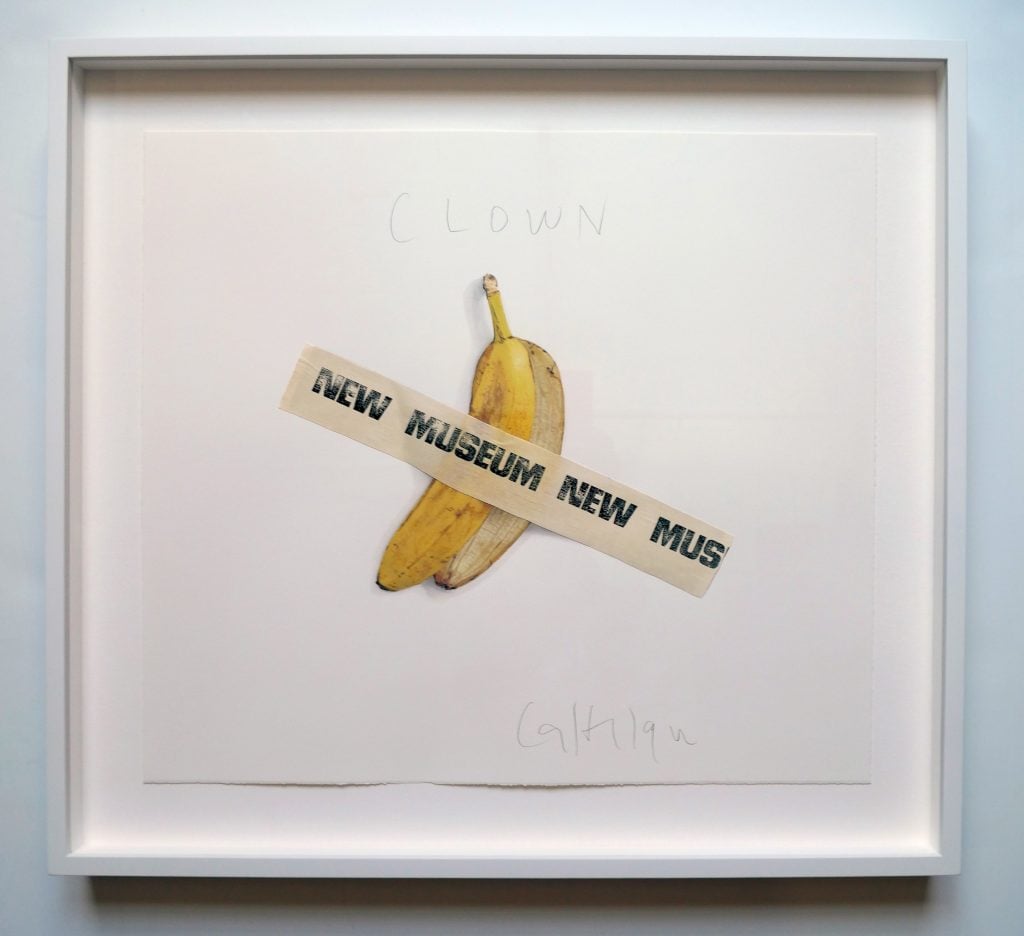
Maurizio Cattelan, Clown (2024). Courtesy Carolina Nitsch, New York.
Institutional Links and Artists of Color
Dealers often place their bets on artists with museum exhibitions just behind or ahead of them, and this year is no exception. Many are artists of color.
Musa points out that collectors will find works by Anthony Akinbola at New York’s Sean Kelly (including a work made from durags), which were featured in an exhibition at the SCAD Museum of Art in Savannah, Georgia. (Prices range from $30,000 to $40,000.) At Carolina Nitsch, Tschabalala Self is showing Princess (2018), a full-length tapestry image of a figure; she has been in a litany of recent museum shows, from the Consortium in Dijon, France, to the Dallas Museum of Art.
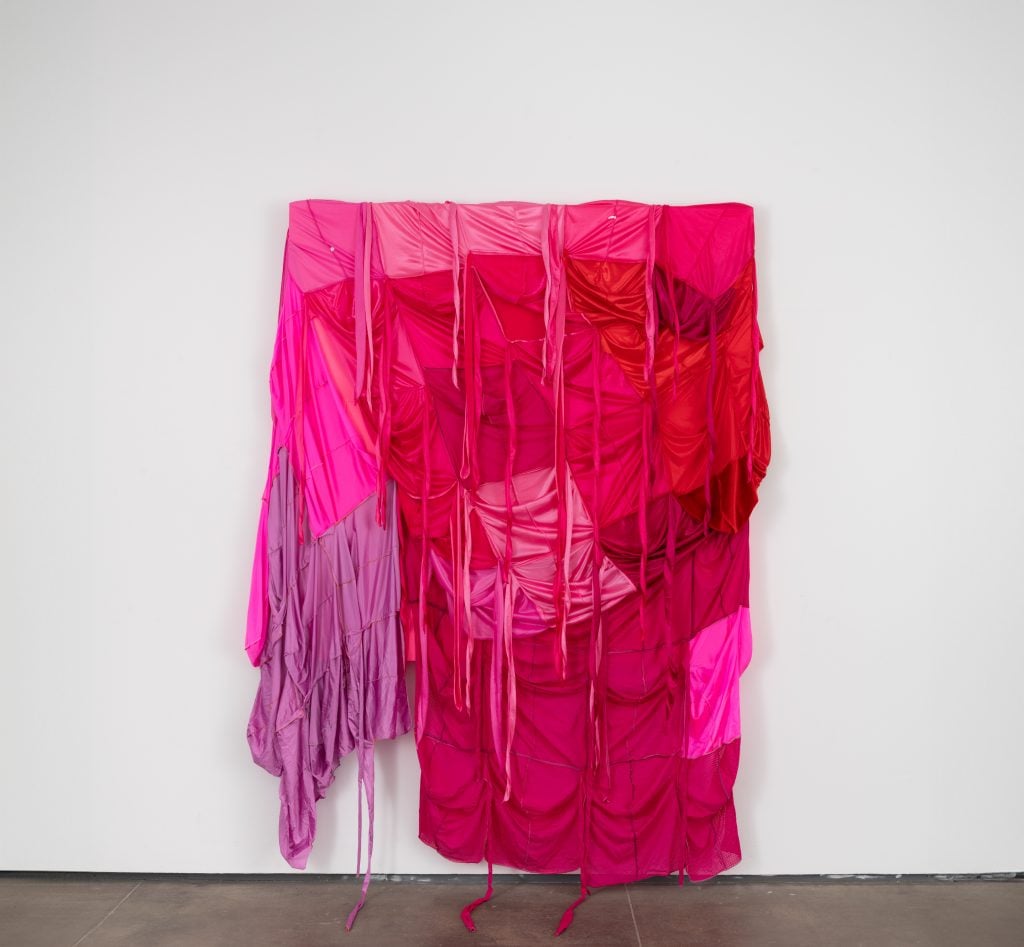
Anthony Akinbola, Wild Irish Rose (2024). Courtesy Sean Kelly Gallery, New York.
Other artists with museum tie-ins include Cuba-born, Puerto Rico–based Zilia Sánchez, who is showing with Galerie Lelong (New York and Paris). The 98-year-old artist, best known for shaped canvases, recently had a career survey at the Institute of Contemporary Art, Miami.
In the Nova section, Nazarian/Curcio (Los Angeles) will present a large painting and a large folding screen by Korea-born, Los Angeles–based artist Ken Gun Min, who recently had his first solo museum outing at the Museum of Contemporary Art Denver and will have a 2025 commission at the Denver Art Museum. Smaller pieces are tagged at $25,000, while two measuring more than 10 feet wide are priced at $90,000.
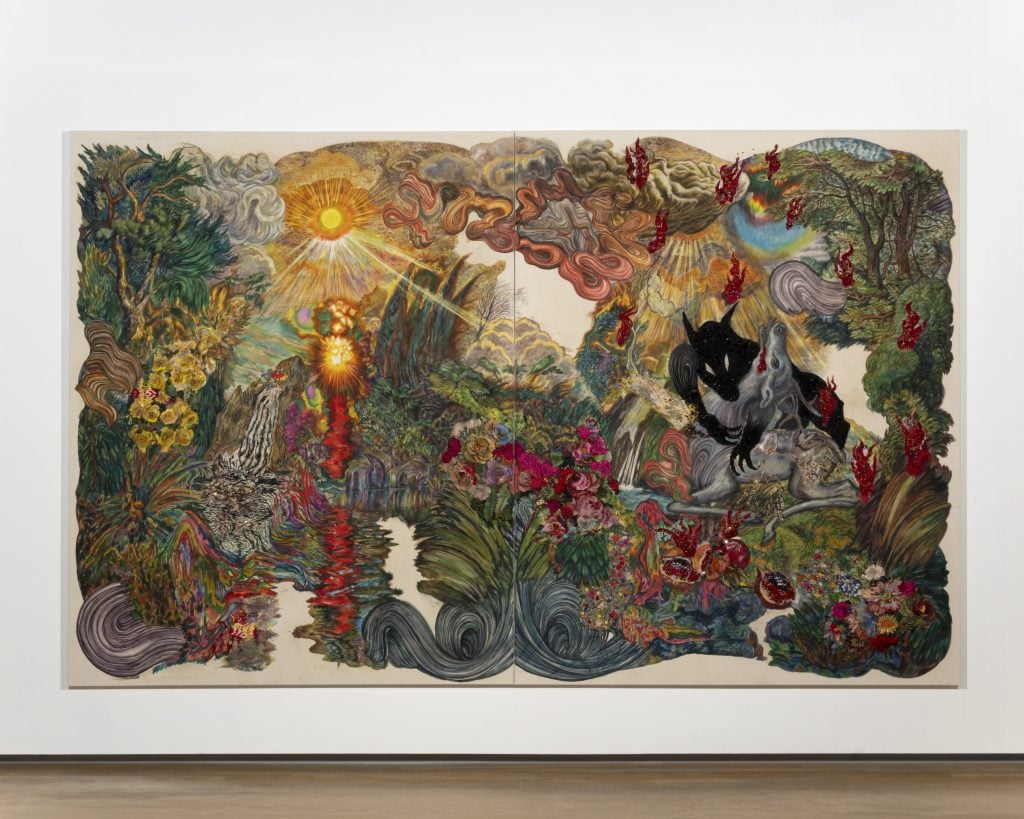
Ken Gun Min, The vastness is bearable only through love (homage to Carl Sagan, Robert Chanler), 2024. Courtesy Nazarian/Curcio, Los Angeles.
Lehmann Maupin (New York, Seoul, London) wins a double-header; the gallery is showing a new painting by Calida Rawles, who will have her first museum solo at the Pérez Art Museum Miami, as well as silk collages by South Africa’s Billie Zangewa, who has a show at the Frost Art Museum at Florida International University, in University Park, about half an hour’s drive inland from the fair. (The gallery will transport clients to both shows via a chartered bus.)
For her part, Burns sees a more judicious, if still robust, presentation of artists of color.
“Dealers seem less experimental in the artists of color they’re showing,” she said. “There are many Hispanic, Black, Native, and Asian artists, which is great, but for example with the Black artists we’re seeing artists of the highest caliber, like Firelei Báez, Kara Walker, Carrie Mae Weems, and David Hammons. At the height of Black Lives Matter, artists of color were being given individual spotlights, but now they’re more integrated, and I hope that’s better.”
Woven into the Booths: Textile Works
Textile art has veritably taken over the aisles, further evidence that mediums that have been traditionally associated with craft have made a powerful entrance into the high-art sphere. That said, they may still provide more affordable options than painting and sculpture.
Some are young contemporary artists bringing conceptual approaches, such as Akinbola and Self. Some are more traditional: New York’s Nicelle Beauchene will display works by two Gee’s Bend Quilters, Tinnie Pettway and Clara Watson, both making their Basel Miami debut. Pettway’s 8 Point Star (circa 1970s) is priced at $40,000.
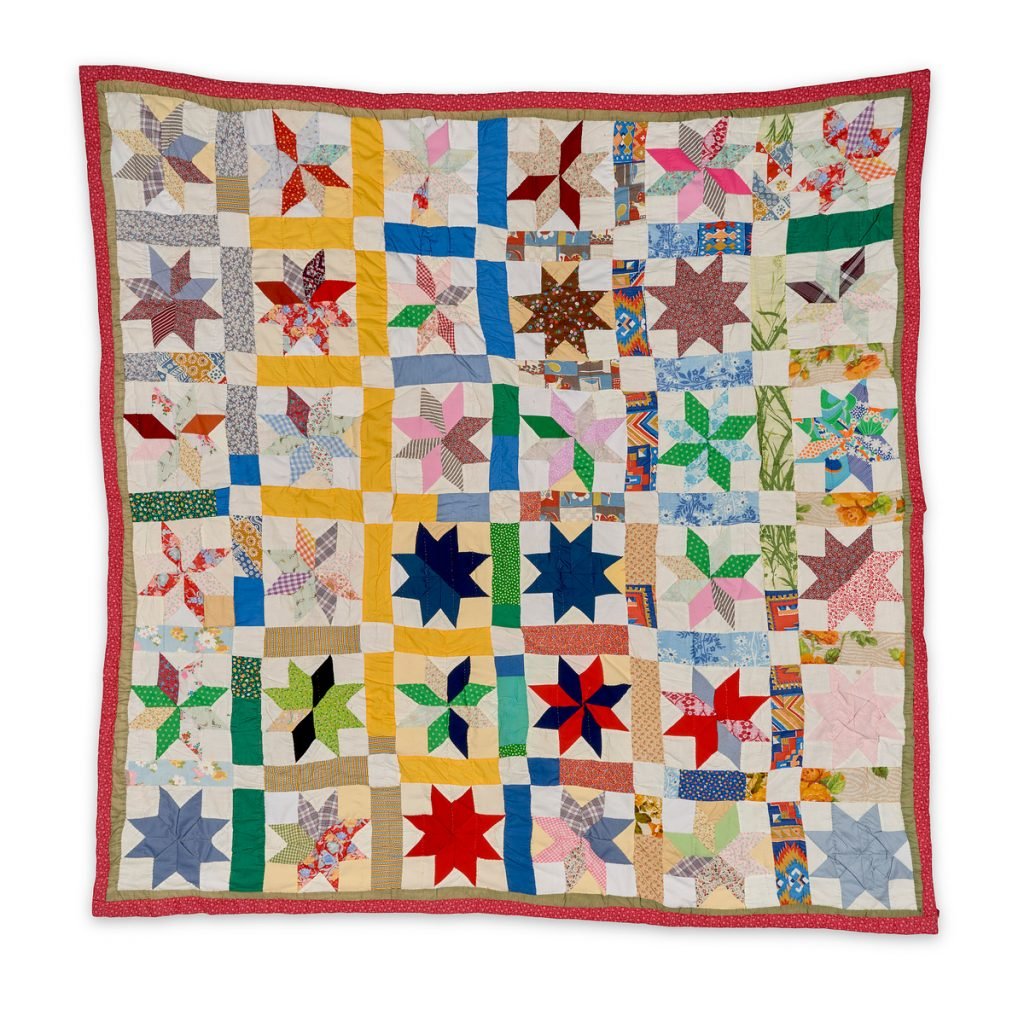
Tinnie Petway, 8 Point Star (c. 1970s). Courtesy Nicelle Beauchene Gallery.
The list goes broadly international. Bahamian American artist April Bey, at Vielmetter Los Angeles, shows works incorporating Jacquard woven textiles with hand-sewn fabric, sequins, and beads with custom clothespins. They’re tagged at $28,000.
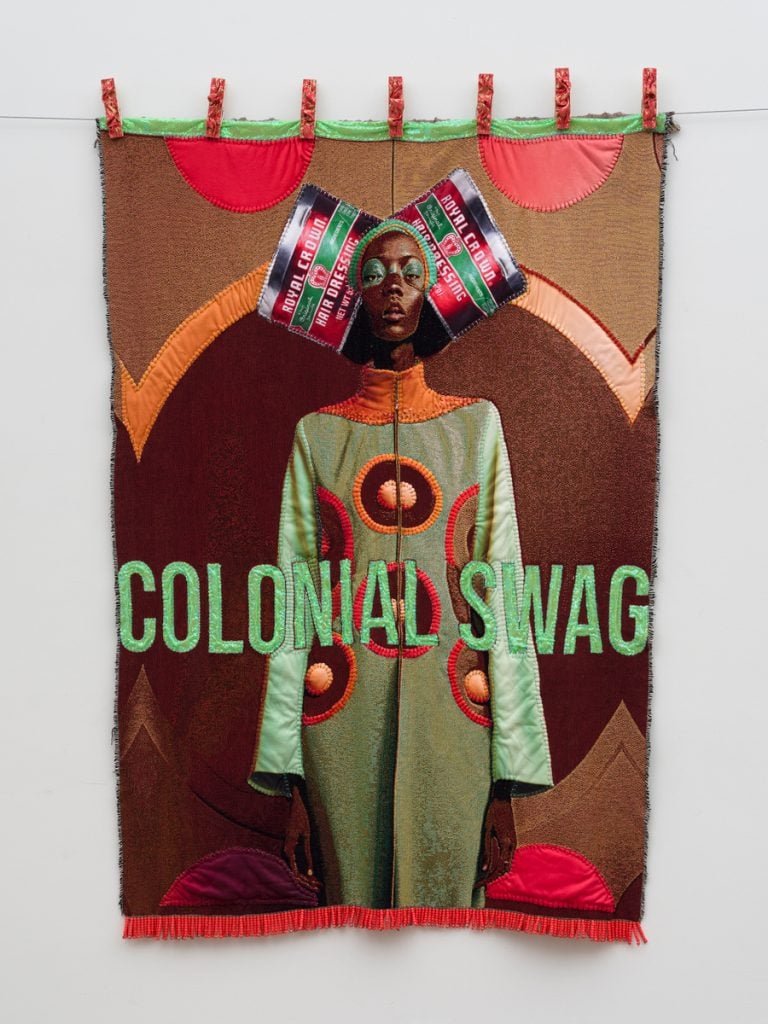
April Bey, You Can’t Even Live Innocently Debt Free on Earth (2024). Courtesy of the artist and Vielmetter Los Angeles. Photo: Jeff McLane.
New York’s Tina Kim Gallery is showing textile works by Korean artists Lee ShinJa and Suki Seokyeong Kang; the gallery’s presentation in the Meridians section features Lee’s tapestries from the 1980s. And Buenos Aires’s Ruth Benzacar Galeria de Arte’s presentation in the Meridians section will show the queer duo Chiachio and Giannone, who have been working together in that city for some 20 years.
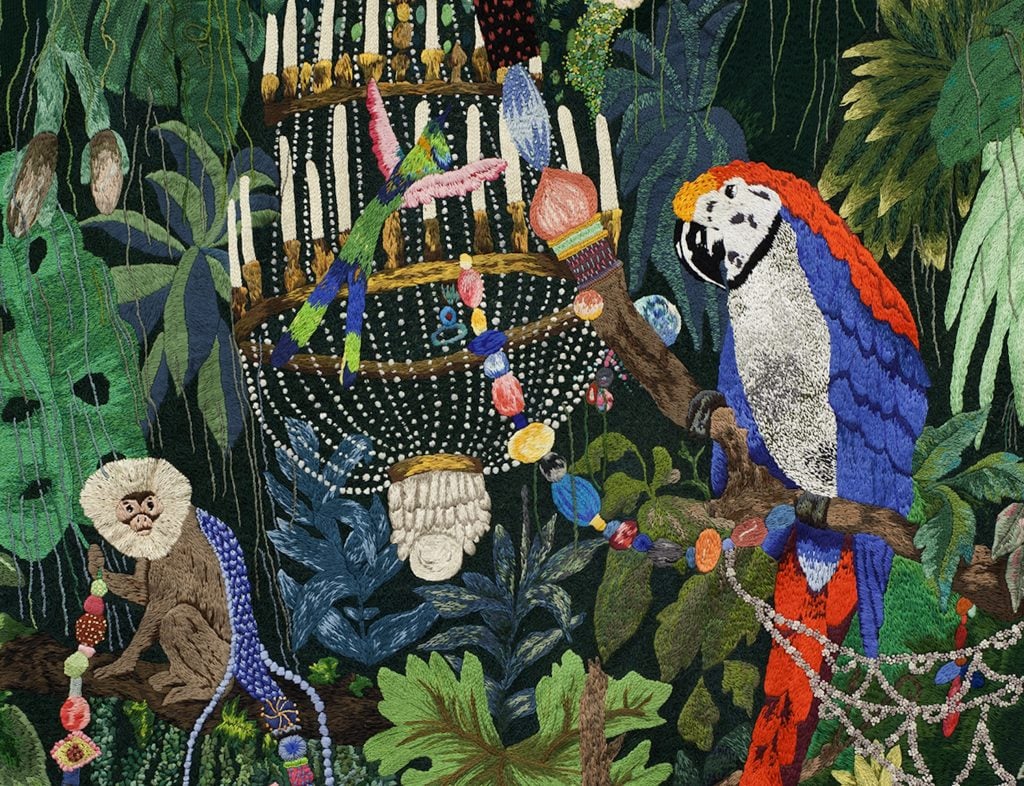
Chiachio and Giannone, La Familia en el alegre verdor (2013–2019), detail. Courtesy Ruth Benzacar Galería de Arte.
Akinbola and Self are definitely both on Musa’s radar; he also cites recent shows by Bisa Butler (at the Art Institute of Chicago in 2021) and Faith Ringgold (at New York’s New Museum in 2022) as high water marks for recognition of textile work.
Musa sees a prosperous fair ahead.
“It’s already written on the wall it will be a successful Basel,” he said. “I have a number of U.S. clients coming this year who don’t always come. Five or six are younger buyers coming into town for the first time.”
While some might lament the demise of the legendary White Cube party at Soho Beach House, Musa thinks it signals a more serious turn.
“I think there will be less partying,” he said, “and more people who are dialed in and actually looking.”


